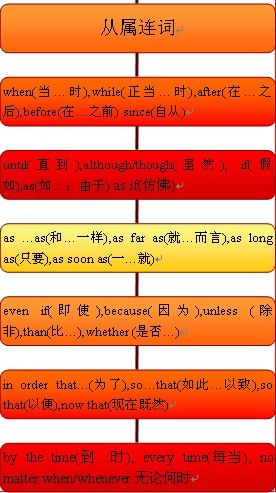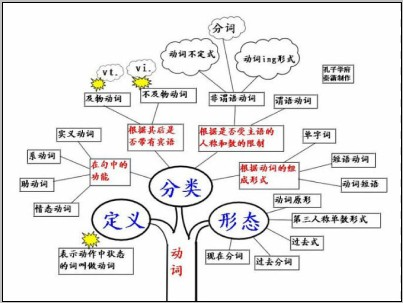本试题 “将下列句子改为含有宾语从句的复合句。1. Does Mr Brown enjoy living in China? Could you tell me?Could you tell me _____ Mr Brown _____ living in Chin...” 主要考查您对连接代词
从属连词
系动词
动词
等考点的理解。关于这些考点您可以点击下面的选项卡查看详细档案。
- 连接代词
- 从属连词
- 系动词
- 动词
连接代词的概念:
连接代词常用来引导一个主语从句、宾语从句和表语从句,在句中可用作主语、宾语、表语、定语等,连接代词主要包括who, whom, what, which, whose, whoever, whatever, whichever, whosever等。
whatever, whoever, whichever 用法说明:
主要用于引导主语从句和宾语从句。
如:He does whatever she asks him to do. 她要他做什么,他就做什么。
Whoever breaks the rules will be punished.谁违反这些规则都将受到处罚。
I'll give the ticket to whoever want sit. 请想要这票,我就把它给谁。
Whichever team gains the most points wins. 哪个队得分最多,哪个队就赢。
注:其中的ever主要用于加强语气,含有“一切”、“任何”、“无论”之义。使用这类词时,注意不要按汉语习惯用错句子结构:
如:任何人(谁)先来都可以得到一张票。
误:Anyone comes first can get a ticket./ Who comes first can get a ticket.
正:Anyone who comes first can get a ticket./ Whoever comes first can get a ticket.
连接代词的用法:
1、连接代词主要包括who, whom, what, which, whose, whoever, whatever, whichever, whosever等,它们在句中可用作主语、宾语、表语、定语等,可以引导主语从句、宾语从句和表语从句:
如:I don't know who he is. 我不知道他是谁。
What he says sounds reasonable. 他说的话听起来很有道理。
The question is who(m) we should trust. 问题是我们该信任谁。
I'll take whoever wants to go. 谁想去我就带谁去。
Take whichever seat you like? 你喜欢坐哪个座位就坐哪个?
I will just say whatever comes into my mind. 我想到什么就说什么。
注:who, whom, whoever等不用于名词前作定语。
2、what的两种用法。请看以下两个句子:
(1)I didn't know what he wanted. 我不知道他想要什么。
(2)I gave her what she wanted. 我给了她想要的一切。
上面第一句中的what表示“什么”,带有疑问的意味;第二句中的what表示“所…的一切事或东西”,其意义上大致相当于that(those) which, the thing(things) that, anything that, all that, as much as等,又如:
What[=That which] you say is quite true. 你说的完全是事实。
He saves what[=all that] he earns. 他赚多少,积蓄多少。
Call it what[=anything that] you please. 你喜欢叫它什么就叫它什么。
这样用的what有时还可后接一个名词:
如:He gave me what money[=all the money that] he had about him. 他把身边带有的钱全给了我。
What friends[=All the friends that] he has are out of the country. 他所有的朋友都在国外。
连接代词知识体系:

whatever, whoever, whichever 用法说明:
主要用于引导主语从句和宾语从句。
如:He does whatever she asks him to do. 她要他做什么,他就做什么。
Whoever breaks the rules will be punished.谁违反这些规则都将受到处罚。
I'll give the ticket to whoever want sit. 请想要这票,我就把它给谁。
Whichever team gains the most points wins. 哪个队得分最多,哪个队就赢。
注:其中的ever主要用于加强语气,含有“一切”、“任何”、“无论”之义。使用这类词时,注意不要按汉语习惯用错句子结构:
如:任何人(谁)先来都可以得到一张票。
误:Anyone comes first can get a ticket./ Who comes first can get a ticket.
正:Anyone who comes first can get a ticket./ Whoever comes first can get a ticket.
从属连词的概念:
连词用于引导从句以形成句子的一部分或修饰句子的构成要素的叫作从属连词。
英语从属连词用法分类详解:
1、引导时间状语从句的从属连词:
(1)表示“当…时候”或“每当”的时间连词。主要的when, while, as, whenever:
如:He jumped up when the phone rang. 电话铃响时他吓了一跳。
We listened while the teacher read. 老师朗读时我们听着。
The phone rang just as I was leaving. 我正要离开,电话铃就响了起来。
(2)表示“在…之前(或之后)”的时间连词。主要的有before, after:
如:Turn the lights off before you leave. 离开前请关灯。
He started the job soon after he left the university. 他大学毕业后就开始做这份工作。
(3)表示“自从”或“直到”的时间连词。主要的有since, until, till:
如:He has lived here since he got married. 他结婚后就一直住在这儿。
Most men worked until[till] they're 65. 大多数男人工作到65岁。
(4)表示“一…就”的时间连词。主要的有as soon as, the moment, the minute, the second, the instant, immediately, directly, instantly, once, no sooner…than, hardly…when等:
如:Tell him the news as soon as you see him. 你一见到他就把这消息告诉他。
I recognized her the moment(that) I saw her. 我一看到她就认出她来了。
I want to see him the minute(that) he arrives. 他一到来我就要见他。
I went home directly I had finished work. 我一干完活就回家了。
Once he arrives, we can start. 他一来我们就可以开始。
(5)表示“上次”、“下次”、“每次”等的时间连词。主要的有every time(每次),each time(每次),(the) next time(下次),any time(随时),(the) last time(上次),the first time(第一次):
如:Last time I saw him, he looked ill. 上次我见到他的时候,他好像有病。
Next time you're in London come and visit us. 你下次来伦敦过来探望我们。
Do look me up next time you're in London. 你下次到伦敦来,一定来找我。
Every time I call on him, he is out. 我每次去访问他,他都不在。
You can call me any time you want to. 你随时都可以给我打电话。
【注】every time,each time,any time前不用冠词,(the)next time, (the)last time中的冠词可以省略,而the first time中的冠词通常不能省略。
2、引导条件状语从句的从属连词:
这类连词主要有if, unless, as[so] long as, incase等:
如:If anyone calls tell them I'm not at home. 要是有人打电话来,就说我不在家。
You will fail unless you work hard. 你若不努力就会失败。
As[So] long as you need me, I'll stay. 只要你需要我,我就留下。
In case I forget, please remind me about it. 万一我忘记,请提醒我一下。
【注】在条件状语从句中,通常要用一般现在时表示将来意义,而不能直接使用将来时态。不过,有时表示条件的if之后可能用will,但那不是将来时态,而是表示意愿或委婉的请求(will为情态动词):
如:If you will wait a moment, I'll fetch the money. 请等一下,我就去拿钱。
3、引导目的状语从句的从属连词:
主要有in order that, so that, in case, for fear等:
如:We used the computer in order that we might save time. 我们使用计算机是为了节约时间。
Speak clearly so that they may understand you. 说清楚,以便让他们能明白你的意思。
Be quiet in case you should wake the baby. 安静些,免得把婴儿吵醒。
He is working hard for fear he should fail. 他努力工作以免会失败。
4、引导结果状语从句的从属连词:
主要的有so that, so…that, such…that等:
如:We're all here now, so that the meeting can begin at last. 我们现在都到齐了,终于能开会了。
It's so difficult a question that none of us can answer it. 那是一个很难的问题,我们没有一个人能回答。
He shut the window with such force that the glass broke. 他关窗户用力很大,结果玻璃震破了。
【注】so that中的that在口语中通常可以省略。
5、引导原因状语从句的从属连词:
主要的有because, as, since, seeing(that), now(that), considering(that)等:
如:He couldn't got to school because he had a cold. 他因患感冒而未能去上学。
Since everybody is here, let's begin our discussion. 大家都到了,我们就开始吧。
Seeing that it is 8o'clock, we'll wait no longer. 由于时间已到8点,我们将不再等了。
Now that you are here, you'd better stay. 你既然来了,最好还是留下吧。
6、引导让步状语从句的从属连词:
主要有although, though, eventhough, even if, while, however, whatever, whoever, whenever, wherever等:
如:Although[Though] he is poor, he is well contented. 他虽穷却能知足常乐。
Though[Even though] it's hard work, I enjoy it. 尽管是苦活,但我乐意干。
Even if you don't like wine, try a glass of this. 即使你不喜欢喝酒,也尝尝这杯吧。
7、引导方式状语从句的从属连词:
主要有as, like, as if, as though, the way等:
如:Do it as[like] he does. 像他那样做。
He behaved as if nothing had happened. 他装作若无其事的样子。
They treat me as though I were a stranger. 他们待我如陌生人。
Nobody else loves you the way(=as) I do.没有人像我这样爱你。
8、引导地点状语从句的从属连词:
主要有where, wherever, everywhere等:
如:There were lots of parks where I lived. 我住的地方有许多公园。
Sit wherever you like. 你想坐在那儿就坐在那儿。
Everywhere they went, they were warmly welcomed. 他们每到一个地方都受到热烈欢迎。
9、引导比较状语从句的从属连词:
主要有than和as…as:
如:It's easier than I thought. 这比我想像的要容易。
They are as often wrong as they are right. 他们错对各半。
10、引导名词性从句的从属连词:
主要有that, if, whether:
如:It is clear enough what he meant. 他是什么意思很清楚。
Your greatest fault is that you are careless. 你最大的缺点是粗心大意。
Whether it will do us harm remains to be seen.是否对我们有害还要看一看。
She didn't say if he was still alive. 她没说他是否还活着。
从属连词知识体系:

用作从属连词的六类名词结构:
英语中有些名词结构可用作从属连词,用以引导状语从句,且主要是时间状语从句。这类结构归纳起来有以下六类:
一、the+瞬间名词:
其中的瞬间名词主要包括moment, minute, instant, second等,其意为“一……就……”,相当于as soon as。
如:The minute he saw her he fell in love. 他对她一见倾心。
Telephone me the moment(that) you get the results. 你一有结果,马上给我打电话。
I was so tired that I fell asleep the instant I closed my eyes. 我很累,一合上眼就睡着了。
Sheputdownthereceiverthesecondsherecognizedmyvoice.她一听出是我的声音,马上就放下电话听筒。
注:其中的瞬间名词后可接that,也可省略。另外,有的个别副词(如directly/immediately等)也可表示类似意思。
如: Immediately the meal was over,he switchedon the radio.饭一吃完他就把收音机打开。
二、the+季节名词:
其中的季节名词包括spring,summer,autumn,winter,其意为“在……的那年春天、夏天、秋天、冬天。
如:His wife left him thes pring he went abroad.在他出国的那年春天,他的妻子离开了他。
He sold his house and went to the souththe summer he lost hisjob.在他失业的那年夏天,他卖掉房子去了南方。
He was sentto prison the winter his third daughter was born.在他第三个女儿出生的那年冬天,他被关进了监狱。
She got married the autumn she graduated from college.她大学毕业的那年秋天就结婚了。
三、the+时间名词:
其中的时间名词主要包括hour,day,night,week,month,season,year等,其意为“在……的时候、那天、那个晚上、那周、那个月、那个季节、那年”。
如: The hour he wa sin her office,he felt very sad.当他在她办公室的时候,他感到很伤心。
The day here turned home,his father was already dead.他回家的那一天,他的父亲已经死了。
The night I wenttoseeher,shehadleftforBeijingtoattendanimportantmeeting.就我去看她的那个晚上,她到北京去开一个重要的会议了。
Mr Smith didn't go to work the week his wife was ill.史密斯先生在他妻子生病的那个星期没去上班。
They ear helivedinthecountry,he learned alot.他在乡下呆的那一年,他学到了不少东西。
四、the+序数词+time
其中的序数词包括first,second,third,fourth等,其意为“当第几次……的时候”。
如: My girlfriend beat me at pokert he first time weplayed.我头一次和女朋友打扑克,她就把我赢了。
These cond time I saw her,she looked like an old woman.我第二次见到她时,她看上去像一个老太婆。
The third time I went there,I found all of them had left and the offices were all empty.我第三次去那儿时,我发现他们都离开了,所有的办公室都是空的。
注:
1.next,last也具有类似序数词的性质,因此也具有以上用法。
如: Nexttimeyoucomein,pleaseclosethedoor.下次你进来,请关门。
Thelasttimewetalkedhesaidheneededanothertwodays.上次我们谈话时他说他还需要两天。
2.thefirsttime,thesecondtime,thethirdtime等用作连词引导时间状语从句时,其前通常要有定冠词,而(the)nexttime,(the)lasttime引导状语从句时,其中的冠词可以省略,如下面这道上海高考题,其答案是C,不是A:
I though ther nice and honest______Imether.
A.first time B.fo rthe first time C.the first timeD.by the first time
五、不定代词+time
其中的不定代词主要包括each,every,any等。
如:Every time I ringher,the phone is engaged.我每次给她打电话,电话都占线。
Every time I see him he either wants to tell me his trouble or borrow some money.每次我见到他,他不是向我诉苦,就是要向我借钱。
He felt nervous each times he spoke to him.每次她和他讲话,他都感到紧张。
AnytimeyoucometoLondondolookmeup.你无论什么时候到伦敦来,一定要来看我。
注意:everytime,eachtime,anytime用作连词引导状语从句时其前习惯上不用冠词,它与the first time,these cond time,the third time等引导时间状语从句时其前必须要用定冠词不同。
六、其他名词结构
以上归纳的名词结构均用于引导时间状语从句,有些其他结构还可引导其他性质的状语从句,如the way可用于引导方式状语从句,表示“像……一样”。如:
The didn’t do it the way we do now.那时他们不像我们现在这样行事。
Joyce looked at me the way alotof girls did.乔伊丝像许多姑娘那样瞧着我。
注:这样用的theway与as用法相似。
如:Hold itin both hands,the way(=as)Mummy does.用两只手捧住,像妈妈那样。
系动词的概念:
连系动词(link verb)是一个表示谓语关系的动词。它必须后接表语(通常为名词或形容词)。连系动词的功能主要是把表语(名词、形容词、某些副词、非谓词、介词短语、从句)和它的主语联系在一起,说明主语的属性、特征或状态。它有自己的但不完全的词义,不能在句中独立作谓语,必须和后面的表语一起构成句子的谓语。它是虚词。
系动词的分类:
1、状态系动词:
用来表示主语状态,只有be一词。
例如:He is a teacher. 他是一名教师。(is与补足语一起说明主语的身份。)
2、持续系动词用来表示主语继续或保持一种状况或态度,主要有keep, rest, remain, stay, lie, stand:
例如:The weather will continue cold and wet.
He remained poor after 20years.
The shop will stay open at 11:00p.m.
He stood/sat silent there.
3、表像系动词:
用来表示"看起来像"这一概念,主要有seem, appear, look。
例如:She appears to have know this thing.
She seems a student.
4、感官系动词:
感官系动词主要有feel, smell, sound, taste。
例如:The silk feels soft.
Your idea sounds a good one.
He looked like his mother.
The mixture tasted terrible.
The flower smells sweet.
5、变化系动词:
这些系动词表示主语变成什么样,变化系动词主要有become, grow, turn, fall, get, go, come, run。
例如:My dream o fcoming to China has come true.
In summer food often goes bad.
He turned doctor./ He became a doctor.
He fell asleep as soon as he went to bed.
6、终止系动词表示主语已终止动作,主要有prove, turn out,表达"证实","变成"之意。
例如:The truth he stuck to proved true.
系动词基本用法:
连系动词是表示不完全谓语关系的动词,它与其后的表语一起构成谓语。
常见的连系动词有be(是),become(成为),get(变成),remain(还是),seem(似乎是),look(看上去),feel(感觉)等。
连系动词后的表语通常是名词和形容词,有时也可以是代词、数词、副词、介词短语、不定式、动名词、从句等:
如:His English is excellent. 他的英语很棒。(跟形容词)
He is a famous poet. 他是著名诗人。(跟名词)
Money isn't everything. 金钱不是一切。(跟代词)
She was the first to arrive. 她是第一个到达的人。(跟数词)
Who is up stairs? 谁在楼上?(跟副词)
He is with his friends. 他和朋友在一起。(跟介词短语)
He seems to be ill.他似乎病了。(跟不定式)
Seeing is believing. 眼见为实。(跟动名词)
This is what you need. 这就是你需要的。(跟从句)
注:有些系动词又是实义动词,该动词表达实义时,有词义,可单独作谓语。
例如:1、She tasted①the soup to see if it tasted②too salty. 她尝了一口汤,看是否太咸。
2、The doctor is feeling①his pulse because he feels②sick. 因为身体不舒服,医生正在给他切脉。
3、The mother looked①at the sick child sadly and she looked②sad. 母亲难过地看着生病的孩子。
4、She smelled①the meat to make sure it still smelled②good. 她闻了闻肉,看看是否还新鲜。
5、The teacher asked the students to keep②quite when they were keeping①everything in order. 当学生整理东西时,老师让他们保持安静。
从以例子不难出,标①的动词为实义动词,他们后跟有宾语;标②的动词为系动词,其后往往跟形容词、名词、不定式等作表语。
系动词知识体系:

连系动词使用应注意的两点:
1、关于连系动词后接副词作表语:
连系动词后通常可接形容词作表语,一般不接副词:
误:His English is very well. 他的英语很好。(应将well改为good)
误:Be carefully. 小心点。(应将carefully改为careful)
误:The soup tastes nicely. 这汤味道不错。(应将nicely改为nice)
但是,有时连系动词后也可接副词作表语,不过这主要限于in, on, off, out, away, behind, up, down, over, through, around, round, below, inside, outside等少数副词小品词以及here, there, upstairs, downstairs等少数表示地点或方位的副词:
如:Mother wasn't in last night. 母亲昨晚不在家。
The meeting was over at five. 会议五点结束。
Come along. The taxi is outside. 来吧,出租车在外面。
Mother is downstairs waiting for you. 母亲在楼下等你。
2、关于连系动词后接不定式:
(1)连系动词be后根据情况可自由地接不定式作表语:
如:My dream is to be a scientist. 我的梦想是当一名科学家。
All I could do was to wait. 我只能等。
My plan was to go from London to Paris. 我计划从伦敦去巴黎。
I was to have seen Mr Kay. 我本要去见凯先生的。
(2)seem, appear, prove, continue, turn out, get, grow, come等连系动词后也可接不定式(尤其是to be)作表语:
如:She always seems to be sad. 她常常显得很忧伤。
My advice proved to be wrong. 我的意见证明是错的。
She appears to have many friends. 他好像有很多朋友。
The weather turned out to be fine. 天气结果很好。
Circumstances continue to be favorable. 情况仍然是有利的。
He has grown to like studying English. 他渐渐喜欢学英语了。
【注】
若所接不定式为to be,通常可以省略。不过,若其后接的是表语形容词,则to be通常不宜省略。
另外,连系动词look后能否接tobe似乎尚有争论,不过,在现代英语中接to be的现象已较普遍。
(3)sound, smell, feel, taste, become等连系动词后通常不能接不定式:
误:These oranges taste to be good. (应去掉to be)
误:The roses smell to be nice.(应去掉to be)
(4)有的连系动词后接的从句可用不定式来改写:
如:It seems that she's right./ She seems to be right. 她似乎是对的。
It appears that you have made a mistake./You appear to have made a mistake. 似乎你弄错了。
动词的定义:
表示动作中状态的词叫做动词。根据其在句中的功能,动词可分为行为动词、系动词、助动词和情态动词四类,有些动词是兼类词。
例如:We have lunch at 12. (have是行为动词)
We have been to NewYork. (have是助动词)
I am hungry. (am是系动词)
You need not have waited for me. (need是情态动词)
The door needs painting. (need是兼类词)
动词的分类:
1)表示动作中状态的词叫做动词。
2)根据其在句中的功能,动词可分为四类,分别是:
实义动词(Notional Verb)、系动词(Link Verb)、助动词(Auxiliary Verb)、情态动词(Modal Verb)。
说明:有些情况下,有些动词是兼类词。
例如:We are having a meeting. 我们正在开会。(having是实义动词。)
He has gone to NewYork.他已去纽约。(has是助动词。)
3)动词根据其后是否带有宾语,可分为两类,分别是:
及物动词(Transitive Verb)、不及物动词(Intransitive Verb),缩写形式分别为vt.和vi.。
说明:同一动词有时可用作及物动词,有时可用作不及物动词。
例如:She can dance and sing. 她能唱歌又能跳舞。(sing在此用作不及物动词。)
She can sing many English songs. 她能唱好多首英文歌曲。(sing用作及物动词。)
4)根据是否受主语的人称和数的限制,可分两类,分别是:
限定动词(Finite Verb)、非限定动词(Non-finite Verb)。
例如:She sings very well. 她唱得很好。(sing受主语she的限制,故用第三人称单数形式sings。)
She wants to learn English well. 她想学好英语。(to learn不受主语she的限制,没有词形变化,是非限定动词。
说明:英语中共有三种非限定动词,分别是:动词不定式(Infinitive)、动名词(Gerund)、分词(Participle)。
5)根据动词的组成形式,可分为三类,分别是:
单字词(One-Word Verb)、短语动词(Phrasal Verb)、动词短语(Verbal Phrase)
例如:The English language contains many phrasal verbs and verbal phrases. 英语里有许多短语动词和动词短语。(contains是单字动词。)
Students should learn to look up new words in dictionaries. 学生们学会查字典。(look up是短语动词。)
The young ought to take care of the old. 年轻人应照料老人。(takecareof是动词短语。)
6)动词有五种形态,分别是:
原形(OriginalForm)、第三人称单数形式(Singular From in Third Personal)、过去式(Past Form)、过去分词(Past Participle)、现在分词(Present Participle)。
动词知识体系:

与“将下列句子改为含有宾语从句的复合句。1. Does Mr Brown enjo...”考查相似的试题有:
- ___ surprised me most was ____the girl passed the driver test.[ ]A. What; thatB. What ; howC. That; thatD. That ;why
- The new research center will be set up _____ was a wasteland 20 years ago.[ ]A. in whatB. whereC. in whichD. there
- —Will you go to Tom's birthday party tomorrow? —No,________invited to, for she is the last person I'd like to see.A...
- If we work hard, we can overcome any difficulty, ________ difficulty it is.[ ]A. whatB. howC. whateverD. however
- ______time went on, the people in the area came to realize how serious the environment had been polluted.A.AsB.With...
- Mr Smith closed all the windows while driving______ he wouldn’t catch a cold.A.sinceB.so thatC.becauseD.as if
- 短文改错。此题要求改正所给短文中的错误。对标有题号的每一行作出判断;如有错误( 每行只有一个错误) ,则按下列情况改正:此...
- Tom didn't _____ his primary school classmate Mary until he listened to her self-introduction.[ ]A. knowB. findC. rec...
- In the country the price of vegetables________ sharply in a short time, which arises panic among some customers.A.ha...
- Pat decided to ______ eating fast food to lose some weight and keep fit.A.look forward toB.break up withC.come up ...